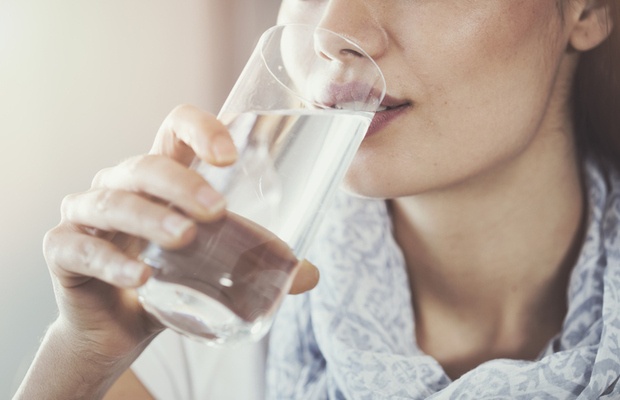We all know that our bodies are made up of 75 percent water, and that we need to ensure we drink enough water daily. But why is that?
The water in our bodies is essential for all its functions, from our brain to our skin. It helps to regulate our body temperature and keep the body in homeostasis, a stable balance that allows the body to function properly.
Being well hydrated also helps us sleep properly, and it curbs binge eating urges (try drinking a glass of water, you may just be thirsty!).
Hydration and the skin
As the largest organ in the body, the skin is naturally affected by our levels of hydration, especially as it is a vital part of the temperature control system – we perspire to cool us down.
In ideal conditions, the skin is in perfect homeostasis, and skin cells are able to produce and maintain the essential elements vital for its health, including collagen and elastin
The great barrier
The key factor for skin homeostasis is a healthy skin barrier. This fine layer that includes lipid chains, rivulets of water and skin cells forms an invisible shield, as part of our skin, to protect it against any pathogens penetrating, and to stop essential water escaping.
When it is healthy, and the skin is hydrated, it looks smooth and radiant. But the telltale signs of dehydration are skin that looks dull, has fine surface lines and an ashy appearance.
No matter what your skin type, it can become dehydrated. Unfortunately, the skin barrier can become compromised as we age (and our hormones change – less oestrogen = drier skin). Lifestyle habits and our environment can all affect it too. See Sensitisation below. And then we have our genetic make-up.
Dry skin (versus dehydrated skin), can have a genetic cause. People who have dry skin might not produce enough of their own moisturising oils and other factors. Dry skin looks dull and feels tight, rough, flaky and itchy. Severe dryness can also be diagnosed as eczema or atopic dermatitis. It is very important to keep this skin well moisturised so you don’t itch and scratch, as injury can result in damage and infection.
Look for nourishing, fragrance-free moisturisers to help, and see a skin doctor to help manage your skin.
Sensitive skin can also have a genetic trigger. This skin is very thin, pale and delicate. It is prone to dehydration, flushing, irritation and redness. This may go hand-in-hand with asthma and other allergies. Here, using fragrance-free skincare designed for sensitive skin is essential, to prevent irritation.
Sensitisation, on the other hand, can occur on any skin. It becomes irritated from exposure to pollution and chemicals, certain fragrances, stress, hormonal fluctuations, smoking, alcohol, poor diet, medical procedures, over-exfoliation and even harsh skincare.
Oily skin makes too much oil. Tell-tale signs include enlarged pores and a very shiny face. It can be temporary (hormone fluctuations during our teens, when we are stressed, etc.) or it could be genetic. Increased sebum production is one of the symptoms associated with acne. An oily skin is not necessarily an acne skin.
As strange as it may seem, even if you have oily skin, it can still become dehydrated (lack of water, not oil). When your skin is oily, It’s extremely tempting to strip your skin of the oil that is making it shiny and feel congested. But in doing this, you strip it of its water-protective barrier. This not only allows your skin to become dehydrated so it feels and looks uncomfortable.
The solution: Find a good skincare range that helps your skin’s oil production to normalise, without stripping. Use a moisturiser – just make sure it is oil-free and absorbs excess oil.
It may be a good idea to avoid products containing denatured alcohol, as this can strip the lipid barrier and lead to sensitised skin.
Normal skin, for the lucky ones, is skin that is in homeostasis. It looks calm, even, dewy and radiant. Skin can change due to external and internal conditions.
Your way to hydration
It is important to hydrate the body from the inside out – through your diet, and it is equally important to hydrate the skin from the outside in – through the right skincare.
Drink (and eat) enough of the right fluids: water, caffeine-free tea, antioxidant-rich vegetables and fruit, bone broth.
Taking a good-quality omega-3 oil supplement to help with those essential fatty acids that build the skin barrier.
Use skincare with ingredients that stop moisture evaporating from your skin.
- Ensure you have a healthy skin barrier by using gentle products that don’t strip it. The Lamelle Nourish range is ideal for normal to combination skin.
- Ask your skincare therapist to recommend a home range with humectant ingredients such as hyaluronic acid, which absorb many times their own body weight of water and trap it in your skin. For extra hydration, a serum containing hyaluronic acid, such as the Lamelle Corrective HA+ can be used twice a day under your normal moisturiser.
- Look for good quality medical aesthetic products with the words ‘hydrating’, ‘moisturising’, ‘nourishing’. Read about their ingredients to find the best one for you.
- You should have a day cream to help protect skin against UV damage and keep it moisturised, and a night cream to help repair and restore the skin in your. A good product to use when you experience dry, dehydrated skin, is the Lamelle Serra Restore Cream. Always follow up with a good SPF, such as the Lamelle Helase 50+ SPF. A great recommendation for night cream, would be Lamelle Dermaheal Renewal Cream
Find our premium range of skincare here: https://www.onlineskinshop.co.za/shop
Have a regular facial to keep your skin in optimum condition. Next time, we discover our new Hydra Touch facial.
Take the quick Beyond Beauty Survey and you could win a R2 000 Skin Renewal voucher to spend in our online store, with free delivery within South Africa. T&Cs apply.
